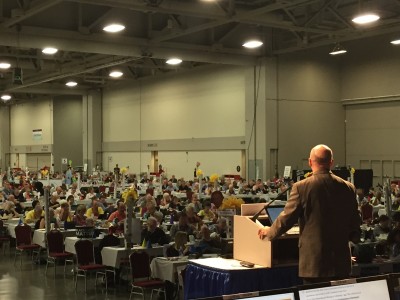
The House of Deputies on Wednesday made marriage equality a reality in the Episcopal Church by concurring with the House of Bishops’ action on resolutions that change the canons on marriage and approve two marriage liturgies for trial use. Together the measures permit same-sex couples to be married in the Episcopal Church, beginning on the first Sunday of Advent of this year.
The resolutions were adopted on votes by orders, with more than 80 percent of the clergy and lay deputies approving each one. Prayer preceded each vote.
The two trial liturgies, which are in Resolution A054, include a gender-neutral version of the current marriage service in the 1979 Book of Common Prayer, as well as a version of a liturgy that was approved in 2012 for blessing same-sex unions that now also provides for vows of marriage. These rites do not refer to “man and woman” or “husband and wife,” but instead use “these persons” or “the couple” to refer to the two people being married.
The 2012 rite, known as “The Witnessing and Blessing of a Lifelong Covenant,” was amended to include improvements that were identified since it was permitted three years ago.
The language of the existing marriage liturgy in the Prayer Book remains unchanged. In support of the resolution, the Rev. Susan Russell, deputy from Los Angeles and a longtime advocate for the rights of LGBT people in the Episcopal Church, said the two resolutions “provide as wide a tent as possible for the historic diversity that characterizes the Episcopal Church – guaranteeing access to marriage liturgies to all couples while protecting the conscience of clergy and bishops who dissent theologically.” She called it “an exemplary illustration of the hard, faithful work of a church refusing to let the perfect be the enemy of the good as it strives to become a more expansive and inclusive church.”
The Very Rev. Jose Luis Mendoza-Barahona, deputy from Honduras, said he opposed the resolution because he believes it goes against biblical principles. “This will create schism in our church,” he said. “It goes against the charity we should be showing fellow Christians.” If it passes, he said he wondered what he was going tell his parishioners when he returns home.
The two trial liturgies were adopted in accordance with Article X of the church’s Constitution, as well as Canon II.3.6, which begins the process of amending the Book of Common Prayer. That action requires votes by two successive General Conventions.
Bishops who object to the trial liturgies are not required to authorize them in their diocese, but all bishops must “make provisions for all couples desiring to be married in this church to have access to these liturgies.”
In a vote by orders, deputies do not cast their votes individually. Rather, each diocese has a single vote in the clergy order and a single vote in the lay order, and a majority of dioceses must vote in favor of a resolution in each order for a motion to pass.
The final vote on the resolutions authorizing liturgies was 94 clergy deputations and 90 lay deputations in favor; 12 clergy deputations and one lay deputation opposed and two clergy and three lay deputations divided (tied).
The canonical changes necessary for rites of marriage of be used for same-sex marriages are contained in Resolution A036, which permits clergy to use either the current Prayer Book marriage rite or one of the two trial-use liturgies when performing marriages.
The resolution also redefines the declaration of intent that couples must sign before being married in the church to make the language more closely align with the vows the couple makes. The committee had heard testimony that the current declaration asks non-believers who are marrying a church member to declare they believe things about marriage that may not believe. The revised declaration asks them to state that they understand the church’s teachings about marriage.
James Steadman, a deputy from the Northwestern Pennsylvania, said that during the church’s 39 years of discussing same-sex marriage, God had been working his purpose out, “whether the church is on board or not.” He added, “For years we have concluded worship by asking that God grant us the strength and courage to do the work he has given us to do. This is the time. Use the courage you have prayed for all these years.”
The Rev. Brian Garrison, deputy from Central Florida, opposed the resolution, saying that this moves the church too far in one direction and “won’t bring about the peaceful kingdom.” He asked that deputies “consider the whole body, no matter how small or insignificant you think that part of the body may be.”
The resolution retains what is often called the discretion clause, which permits clergy to decline to solemnize or bless any marriage. A version of that clause has been a longstanding provision of the canons.
The resolution also recognizes that there are some jurisdictions, including parts of Europe, Latin America and the Carribean, where clergy do not solemnize marriage. The resolution also makes explicit a provision for the blessing of civil marriage, which appears in the Book of Common Prayer but currently has no reference in church canons.
The final vote on this resolution was 85 clergy deputations and 88 lay deputations in favor; 15 clergy deputations and 12 lay deputations opposed and six clergy and lay deputations divided.
Melodie Woerman is director of communications of the Episcopal Diocese of Kansas.